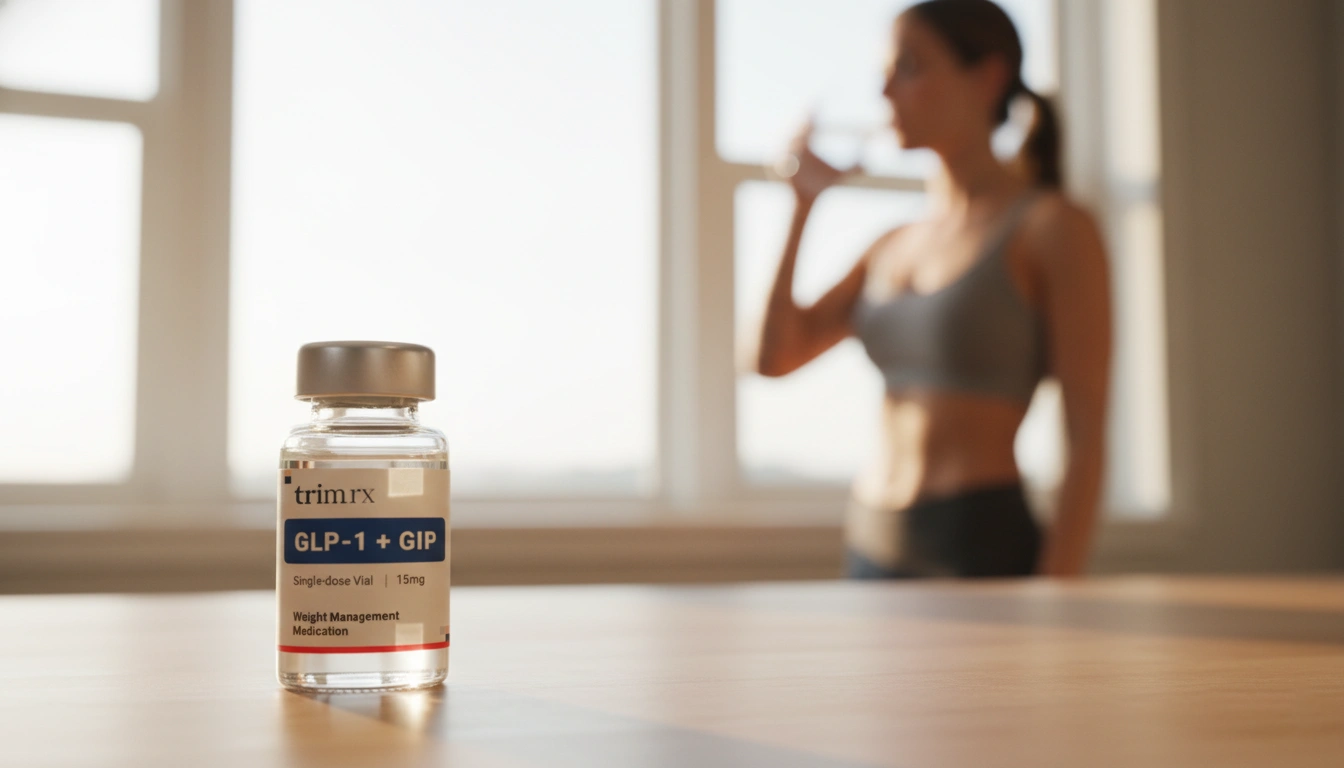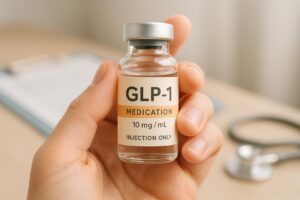Does Compounded GLP-1 Expire? Understanding the Shelf Life and Safety of Your Medications

Have you ever pulled a medication from your fridge only to find that it’s past its expiration date? The heart-sinking realization can lead to a flurry of questions. When it comes to compounded GLP-1 medications, like semaglutide, understanding expiration dates is crucial—not just for efficacy but for safety as well. As these medications continue to gain popularity in weight management and diabetes management, it’s vital to grasp the implications of their expiration dates.
In this blog post, we will delve into the specifics of compounded GLP-1 expiration, exploring how long they last, what happens if you use them past their prime, and best practices for storage. By the end of this article, you will have a comprehensive understanding of how to manage your compounded GLP-1 medications safely and effectively.
Introduction
In a world where health and wellness often come down to the details, the expiration date of your medication can significantly impact your well-being. Recent studies indicate that many patients using GLP-1 medications, such as semaglutide, are unaware of the risks associated with using expired products. As we navigate the landscape of personalized weight loss solutions, it becomes paramount to understand the importance of these expiration dates.
At TrimRx, our commitment to providing safe and effective weight loss solutions extends to ensuring our clients understand every aspect of their treatment. With a focus on transparency and user education, we aim to empower you to take charge of your health. This post will cover several critical areas: the definition of compounded GLP-1 medications, how long they typically last, what you need to know about their expiration, and guidelines for proper storage.
Let’s embark on this journey together, ensuring that you have all the necessary information to make informed decisions about your weight management strategy.
What Are Compounded GLP-1 Medications?
Before we dive into expiration specifics, it’s essential to define what compounded GLP-1 medications are. Compounded medications are tailored formulations created to meet the specific needs of individual patients. Unlike mass-produced pharmaceuticals, compounded drugs can be adjusted for dosage, ingredients, or even delivery methods, making them a versatile option for many.
GLP-1 (Glucagon-like Peptide-1) medications, such as semaglutide, are a class of drugs that mimic the effects of the GLP-1 hormone, which plays a role in blood sugar regulation and appetite control. Compounded GLP-1 medications are often prescribed for weight management as they help to reduce appetite, enhance feelings of fullness, and support overall metabolic health.
At TrimRx, we provide access to a range of these medications, including compounded semaglutide, through our clinically proven, personalized weight loss programs. Our approach ensures not only the safety and efficacy of the medications but also a supportive environment where your health journey is our priority.
How Long Do Compounded GLP-1 Medications Last?
The shelf life of compounded GLP-1 medications can vary depending on several factors, including the compounding pharmacy’s protocols and the specific formulation. Generally speaking, once opened, compounded semaglutide is typically stable for 28 days when stored properly in the refrigerator. However, it’s crucial to note that unopened compounded GLP-1 medications will remain viable until the expiration date indicated on the vial or packaging.
Here’s a breakdown of important timelines:
- Unopened Compounded Semaglutide: Good until the expiration date listed on the vial.
- Opened Compounded Semaglutide: Generally lasts for 28 days in the refrigerator.
It’s advisable to always check specific storage instructions from the pharmacy that dispensed your medication, as variations may exist between different compounding pharmacies.
The Importance of Checking Expiration Dates
Understanding and adhering to expiration dates is not merely a suggestion—it’s essential for your health. Using expired compounded GLP-1 medications can lead to several complications, including:
- Reduced Efficacy: Medications may lose their potency over time, which could hinder your weight loss efforts or blood sugar management.
- Potential Health Risks: The chemical composition of expired medications can change, leading to unanticipated side effects or adverse reactions.
- Risk of Contamination: If compounded medications are not used within their designated time frame, there is a higher risk of contamination, which can lead to infections or other health issues.
At TrimRx, we emphasize not only the importance of quality medications but also the value of understanding their use. We encourage all our clients to take our free assessment quiz to determine eligibility for our personalized weight loss medications, ensuring that every aspect of your treatment is aligned with your individual needs.
What Happens If You Use Expired Compounded GLP-1 Medications?
Using expired compounded GLP-1 medications can have serious implications. While it may be tempting to use a medication that you have on hand, the risks associated with doing so far outweigh any convenience.
Loss of Effectiveness
The primary concern with using expired medications is that they may no longer work as intended. For instance, if you’re relying on semaglutide to help curb your appetite and regulate your blood sugar, using an expired version may lead to a resurgence of cravings or difficulty in maintaining healthy glucose levels. This can derail your weight loss efforts or complicate diabetes management, making it harder to achieve your health goals.
Unknown Side Effects
Another critical aspect to consider is that the chemical composition of medications can alter over time. Once a medication has passed its expiration date, it is no longer guaranteed to be safe or effective. This uncertainty could lead to unexpected side effects that could pose a risk to your health.
Risk of Contamination
Compounded medications, particularly those that are injectable, carry additional risks associated with sterility. An expired compounded GLP-1 may harbor bacteria or fungi, increasing the risk of infections. Using contaminated medications can lead to serious health complications that could require medical intervention.
In light of these risks, we remind all our clients to monitor expiration dates closely and to dispose of any expired medications responsibly. If you ever find yourself with expired compounded GLP-1, consult with your healthcare provider or pharmacy for guidance on safe disposal and potentially obtaining a new prescription.
Best Practices for Storing Compounded GLP-1 Medications
Proper storage of your compounded GLP-1 medications is essential for maintaining their effectiveness and safety. Here are some best practices:
-
Refrigeration: Always store your compounded GLP-1 medications in the refrigerator at temperatures between 36°F to 46°F (2°C to 8°C). Avoid storing them in the door of the refrigerator, where temperatures can fluctuate.
-
Avoid Freezing: Ensure that your medication does not freeze, as this can compromise the integrity of the solution. If your medication accidentally freezes, consult your pharmacy immediately to see if it can still be used.
-
Protect from Light: Keep your medications away from direct sunlight to prevent degradation of the active ingredients.
-
Check Regularly: Make it a routine to check the expiration dates and the physical condition of your medications. Look for any discoloration, cloudiness, or particles in the solution, which could indicate that the medication is no longer safe to use.
-
Follow Guidelines from Your Pharmacy: Each compounding pharmacy may provide specific storage instructions tailored to their formulations. Always refer to these guidelines for the best results.
By adhering to these storage practices, you can maximize the efficacy and safety of your compounded GLP-1 medications, ultimately supporting your weight loss journey.
Conclusion
As we conclude this exploration into compounded GLP-1 medications and their expiration, it’s clear that understanding the shelf life and proper storage can significantly impact your health. At TrimRx, we are dedicated to providing our clients with the information and support they need to navigate their weight loss journeys safely and effectively.
Always remember: the expiration date is there for a reason. Using medications within their designated time frames ensures that you are harnessing their full potential while minimizing any health risks. If you have further questions or concerns about your medications, we encourage you to reach out to your healthcare provider or pharmacy for personalized guidance.
For those ready to take the next step in their weight loss journey, consider taking our free assessment quiz to see if you qualify for our personalized weight loss programs. Together, we’ll explore the best options tailored to your individual needs.
FAQ
How long does compounded GLP-1 last in the fridge?
Compounded GLP-1 medications typically last for 28 days in the fridge once opened. Unopened medications can be stored until the expiration date on the vial.
What should I do if my compounded GLP-1 medication has expired?
It’s best to dispose of expired medications responsibly. Consult your pharmacy for guidance on disposal and inquire about obtaining a new prescription.
Can I still use my compounded GLP-1 if it looks fine but is past the expiration date?
Using expired medications is not recommended, as they may lose effectiveness and pose health risks. It’s always safer to consult with your healthcare provider.
How should I store my compounded GLP-1 medications?
Store your medications in the refrigerator at temperatures between 36°F to 46°F, protect them from direct sunlight, and avoid freezing.
Why are compounded GLP-1 medications not FDA-approved?
Compounded medications are tailored for individual patients and are not subjected to the same FDA approval processes as mass-produced pharmaceuticals. However, they must meet safety and quality standards set by compounding pharmacies.
By understanding the importance of expiration dates and proper storage practices, you can ensure that your health remains a priority throughout your weight management journey.

Transforming Lives, One Step at a Time
Keep reading
Tracking Progress With GLP-1: What To Measure
Learn which metrics to track on GLP‑1 therapy—weight, waist, blood sugar, lipids, side effects, and non‑scale wins—and how often to monitor them.
Fatigue Solutions for Ozempic and Wegovy Users
Hydration, protein-rich meals, light activity, and better sleep can reduce medication-related fatigue and help maintain energy during weight-loss treatment.
GLP-1 Medication Side Effect Checker
Worried about GLP-1 medication side effects? Use our free checker for Semaglutide, Liraglutide, and more to learn what to expect and stay informed!



